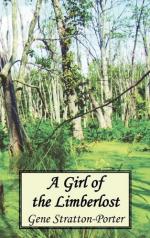The colour returned to Elnora’s face.
“Did you tell your mother about this money, Elnora?” he asked.
“No, I didn’t,” said Elnora. “It’s dreadful not to, but I was afraid. You see they are clearing the swamp so fast. Every year it grows more difficult to find things, and Indian stuff becomes scarcer. I want to graduate, and that’s four years unless I can double on the course. That means twenty dollars tuition each year, and new books, and clothes. There won’t ever be so much at one time again, that I know. I just got to hang to my money. I was afraid to tell her, for fear she would want it for taxes, and she really must sell a tree or some cattle for that, mustn’t she, Uncle Wesley?”
“On your life, she must!” said Wesley. “You put your little wad in the bank all safe, and never mention it to a living soul. It doesn’t seem right, but your case is peculiar. Every word you say is a true word. Each year you will find less in the swamp, and things everywhere will be scarcer. If you ever get a few dollars ahead, that can start your college fund. You know you are going to college, Elnora!”
“Of course I am,” said Elnora. “I settled that as soon as I knew what a college was. I will put all my money in the bank, except what I owe you. I’ll pay that now.”
“If your arrows are heavy,” said Wesley, “I’ll drive on to Onabasha with you.”
“But they are not. Half of them were nicked, and this little box held all the good ones. It’s so surprising how many are spoiled when you wash them.”
“What does he pay?”
“Ten cents for any common perfect one, fifty for revolvers, a dollar for obsidian, and whatever is right for enormous big ones.”
“Well, that sounds fair,” said Sinton. “You can come down Saturday and wash the stuff at our house, and I’ll take it in when we go marketing in the afternoon.”
Elnora jumped from the carriage. She soon found that with her books, her lunch box, and the points she had a heavy load. She had almost reached the bridge crossing the culvert when she heard distressed screams of a child. Across an orchard of the suburbs came a small boy, after him a big dog, urged by a man in the background. Elnora’s heart was with the small fleeing figure in any event whatever. She dropped her load on the bridge, and with practised hand flung a stone at the dog. The beast curled double with a howl. The boy reached the fence, and Elnora was there to help him over. As he touched the top she swung him to the ground, but he clung to her, clasping her tightly, sobbing with fear. Elnora helped him to the bridge, and sat with him in her arms. For a time his replies to her questions were indistinct, but at last he became quieter and she could understand.
He was a mite of a boy, nothing but skin-covered bones, his burned, freckled face in a mortar of tears and dust, his clothing unspeakably dirty, one great toe in a festering mass from a broken nail, and sores all over the visible portions of the small body.




